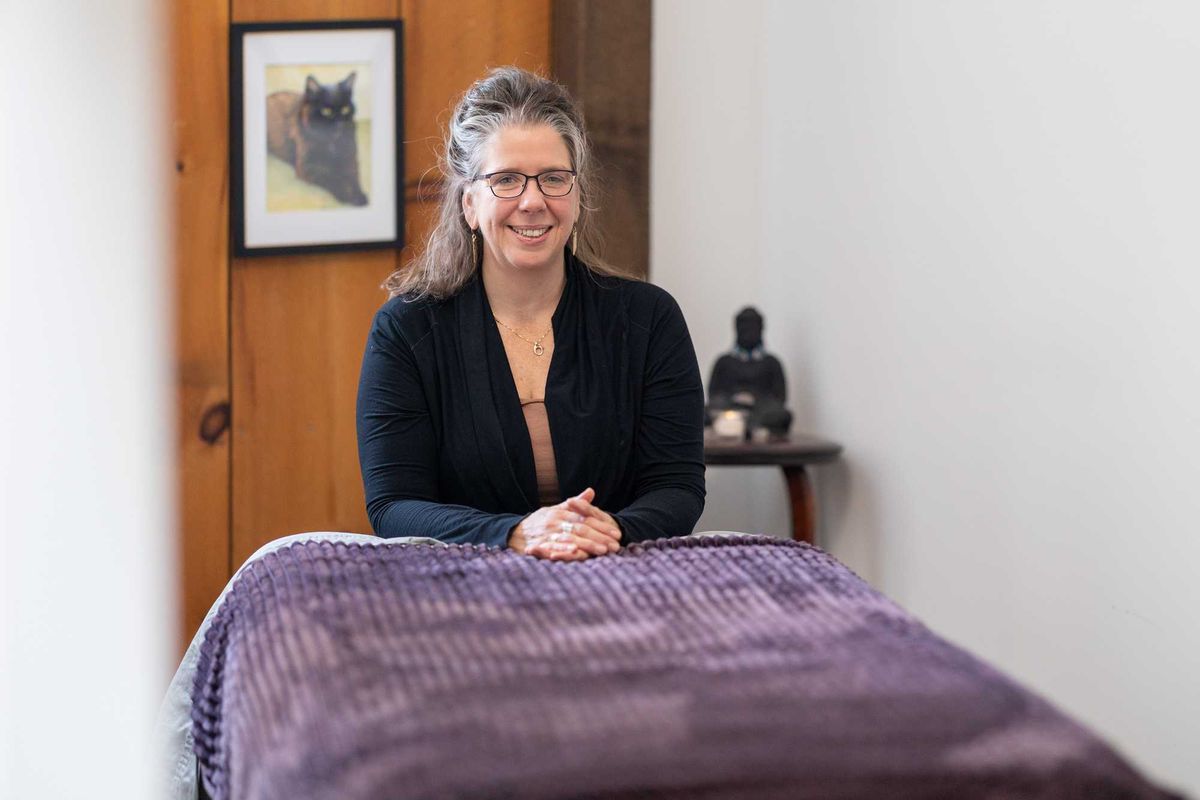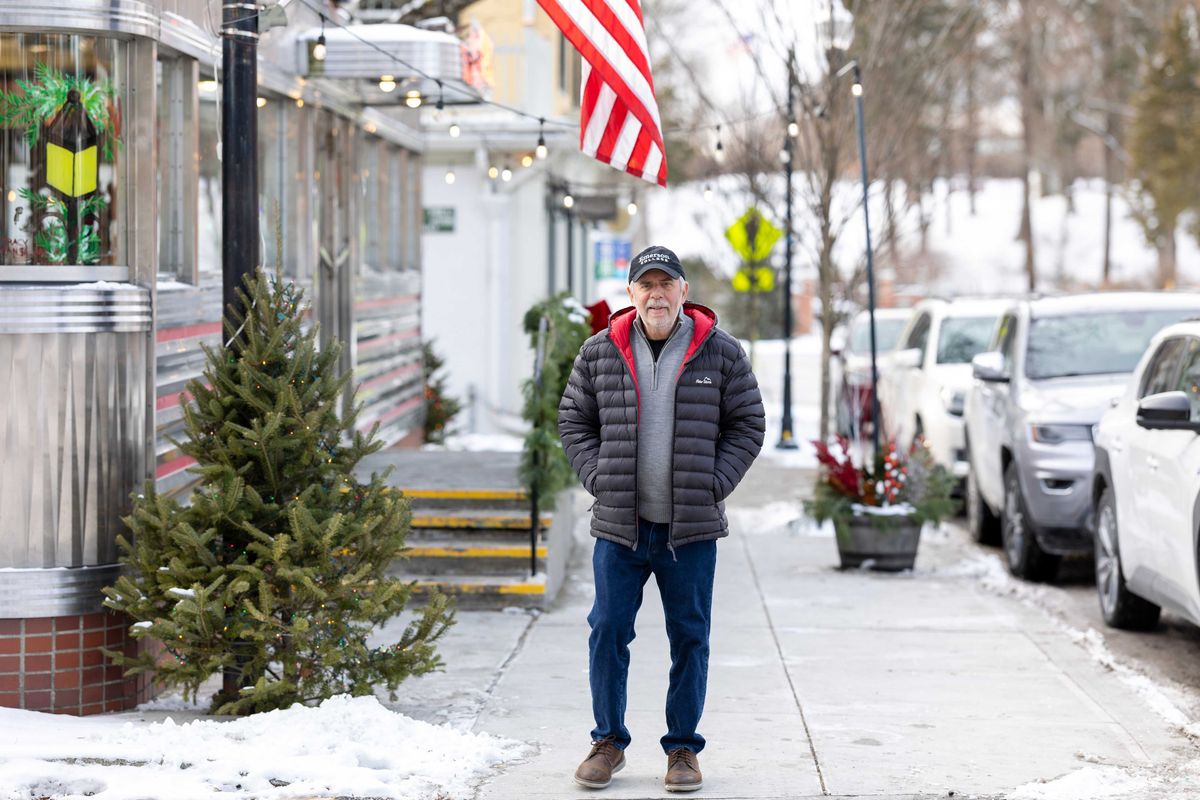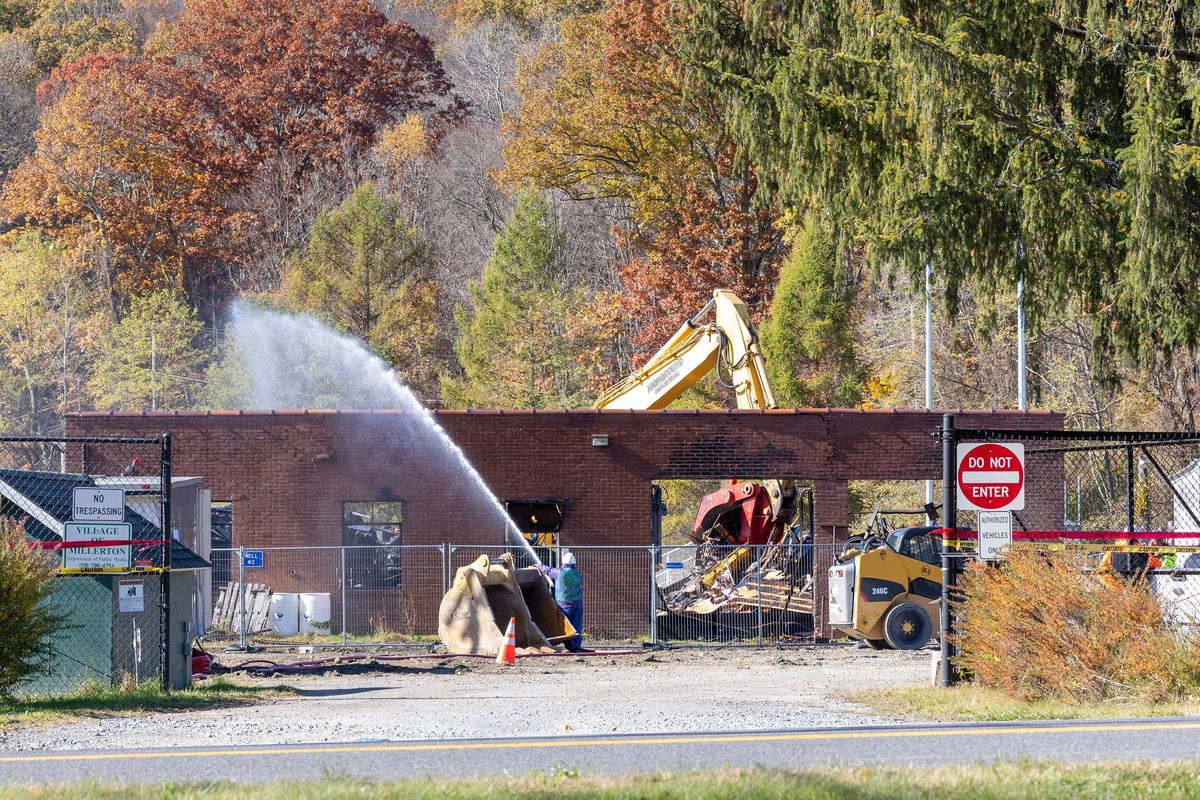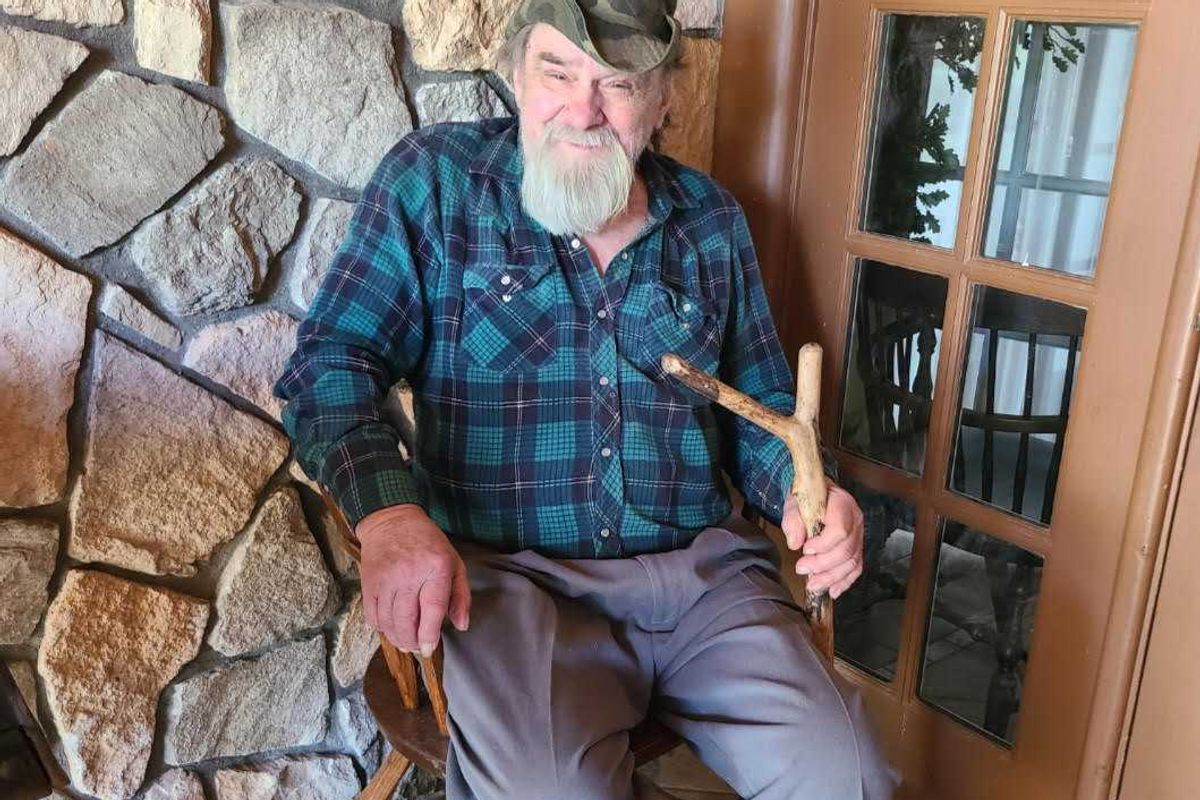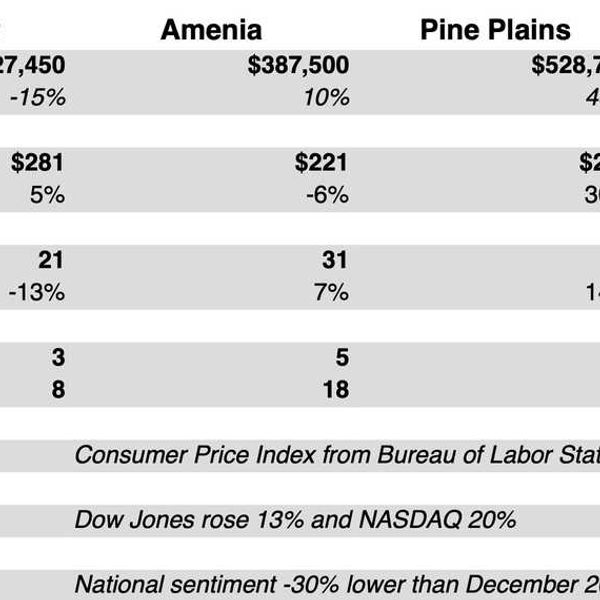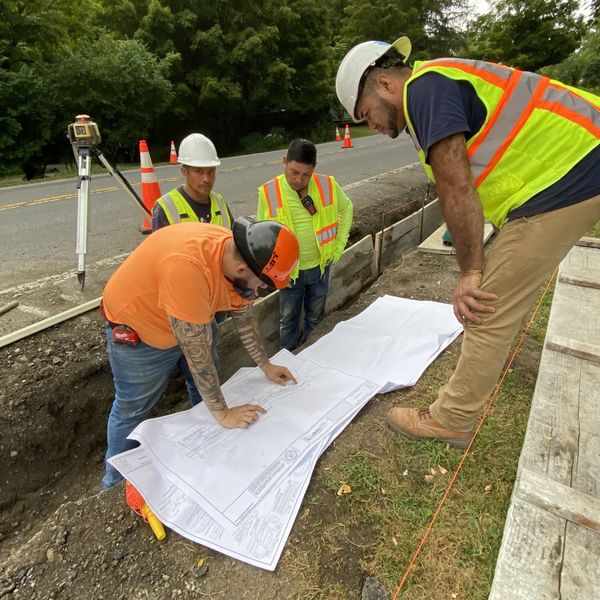Latest News
Aimée Davis in her Millerton massage studio at 65 Main St. Davis offers massage therapy, relationship coaching and reiki in her studio and through home visits.
Photo by Aly Morrissey
MILLERTON — While many view the new year as a starting line for resolutions and new habits, Millerton-based massage therapist and relationship coach Aimée Davis suggests a different course — a marathon, not a sprint. She believes a slower, more embodied approach can lead to greater fulfillment than ticking boxes off a list.
“I’m more of a daily-moment person,” Davis said, explaining that she focuses on small, consistent practices rather than big, rushed goals. Practicing conscious living year-round allows her to forego new year’s resolutions. “I made one yesterday and I’ll make one tomorrow — I’m constantly tracking what’s coming up, what’s drifting and what I want to change.”
As an intuitive healer, Davis has developed a deep appreciation for the human body over the years — and makes it her mission to help others do the same. “The body is so powerful — it’s just brilliant,” Davis said from her cozy, wood-paneled massage room in downtown Millerton.
Located at 65 Main St., the unassuming pink building is also home to naturopathic doctor and acupuncturist Brian Crouse. Davis laughs about their serendipitous meeting — which happened while she was eating a tomato sandwich — a chance encounter that eventually led to their shared workspace. Today, Davis is 12 years into her own practice, shaped by decades of training and experience in both bodywork and relationship counseling.
Although her work exists at the intersection of health and wellness, Davis is reluctant to embrace either label. “I’m in the business of people,” she said after a moment of reflection, adding that she believes there is a light inside of everyone.
Davis said she first discovered this light at age 18 when she worked at Berkshire Meadows, a facility for students with complex medical and developmental disabilities. She felt a pull to work alongside students with the greatest needs — many of whom were in wheelchairs and nonverbal. During this four-year period, Davis was responsible for feeding, bathing and bringing a sense of joy to these students. “We would play music and we became close like family,” Davis reflects on a period of her life when she stepped into the role of nurturer and caregiver. It was around this time that Davis also became a young mother.
The work and her role as a mother ignited a lifelong passion for learning about and supporting people. Davis said that, as a Capricorn, she tends to go all in when it comes to studying or understanding something. From training in chakras and reiki to studies in neurology, anatomy, and physiology, Davis has embraced lifelong learning and continues to see value in gaining knowledge from both peers and her community.
One mantra Davis lives by is “if it’s not a heck yes, it’s a heck no,” a mentality rooted in trusting intuition, being present, and coming back to your body. Each career stop has been a stepping stone to her current practice, which itself continues to evolve with the addition of relationship coaching and intuitive healing to supplement massage therapy.
Trusting intuition is core to her job, and was core to her following her own path. While it can feel scary to take a leap and start something new, Davis said she knew she was ready to put her “sunglasses on and jump into the bright abyss.” For anyone thinking about taking their own leap, Davis said, “the rhythm begins if you’re in alignment and doing what you’re meant to be doing.”
Today, she works with clients in a variety of ways — and no two sessions are the same. Davis said she has moved away from lengthy intake forms in favor of simply sitting with someone and meeting them where they are. “What I care about is how you are today,” she said, noting that what emerges in one session may look entirely different in the next.
While Davis is trained in anatomy, physiology and neurology — and works regularly with muscle tension, injury recovery and post-surgical care — she is also attuned to the emotional and energetic patterns that can surface in the body. She describes her approach as intuitive and often guided by things that are difficult to articulate. Information can come to Davis through sensation, temperature or imagery that arises as she works.
One early experience in her practice remains formative. Davis recalled working with a client whose blood tests suggested something was wrong, though no diagnosis had yet been made. While working near the client’s liver, Davis said she experienced a powerful and unsettling visual that gave her pause. Unsure how to proceed, she sought guidance from trusted mentors before eventually encouraging the client to pursue further care.
A later diagnosis confirmed liver cancer. More than a decade later, Davis continues to work with that same client and has at times served as a patient advocate, accompanying her to medical appointments.
While Davis is adamant that she does not replace medical care, she trusts what shows up. “I’ve learned not to ignore it,” she said.
As the new year unfolds, Davis hopes people will resist the urge to overhaul themselves overnight and instead consider what it might mean to slow down and build support. She encourages people to think in terms of a “care team,” recognizing that wellness does not have to take a single form.
“I just want people to give their wellness a better chance,” she said. For Davis, the work is less about resolutions and more about relationships — to the body, to one another, and to the rhythms that already exist beneath the noise.
“We still have choices,” she said. “And when we take care of ourselves, we’re better able to take care of each other.”
Keep ReadingShow less
Eric Alexander stands in front of the Millbrook Diner on Franklin Avenue in the Village of Millbrook. Alexander was elected to represent District 25 in the Dutchess County Legislature.
Photo by Aly Morrissey
MILLBROOK — Fresh off a narrow win in the race for Dutchess County Legislature, newly elected Eric Alexander — whose victory helped flip the county from red to blue — said the shift marks a “renewed commitment to good governance.” In November, Democrats took control of the legislature for the first time since 2008, and Alexander edged out his Republican opponent, Dierdre Houston, by just 41 votes.
A first-time candidate with an extensive career spanning communications and financial services, 69-year-old Alexander said, “To be able to start a new chapter at this stage of my life, I really hope I’ll be able to make a difference.”
Alexander — a first-generation American — is wrapping up his tenure as Board Chair of Emerson College, his alma mater. While on the board he has worn multiple hats, including chairing the Investment Committee and supporting the finance, audit and institutional advancement committees. Alexander gets a kick out of telling people he holds a “B.S. in Speech,” which he jokes will serve him well in politics.
Jokes aside, as his work in education winds down, Alexander is ramping up his own education as he gets up to speed on the requirements of the legislature and what will be expected of him. He plans to work with colleagues across party lines to benefit Dutchess County, with a particular focus on District 25, which includes Amenia, the Town of Washington, the Village of Millbrook, and Pleasant Valley.
“Bipartisanship brings good things like checks and balances,” Alexander said, adding that one-party leadership has led to wasteful spending and a lack of transparency within the county.
Alexander said he plans to judge his first year in office by whether the needs of rural communities are better understood across county government. “Broader and better awareness of the needs of this part of the county — that’s success,” he said, adding that a more collaborative process would also be an indicator of success.
He is also committed to “maximizing vertical integration of government,” meaning tighter coordination between town, county and state officials. Having met State Sen. Michelle Hinchey several times, Alexander said he will “unabashedly advocate” for constituents in his district.
He said housing, transportation and the EMS crisis are among the top priorities as he heads into the new year. Alexander is critical of the recent vote to spend another $2 million on supplemental ambulance services, which he described as a Band-Aid. “It’s kind of like trying to rent a solution,” he said. While the county-supported supplemental services improved EMS response time in some areas, Alexander said, “Not here — not in my town. So, that’s my job, to represent these communities.”
He also warned that the county’s growing reliance on private EMS providers like Empress — which is backed by private equity — could create long-term vulnerabilities. “Every year, we are the product and the client,” he said. “And we should consider being the competition.”
Though 12 months may not seem like enough time to achieve meaningful change, Alexander laughed, “Nothing is more motivating than a one-year term.”
Drawing on his communications experience — which played a role in his campaign — Alexander plans to keep constituents informed and engaged through a newsletter and social media content. He said, “I want to be very available and visible.”
Keep ReadingShow less
Demolition crews from BELFOR Property Restoration began demolishing the fire-ravaged Water and Highway Department building in the Village of Millerton on Oct. 27, 2025.
Photo by Aly Morrissey
MILLERTON — With another winter underway and new snow-removal equipment now in place, the village is reminded of the February morning when a fire destroyed Millerton’s highway and water department building on Route 22, wiping out everything inside and setting off a year of recovery and rebuilding. The blaze broke out in the early hours of Feb. 3, as snow covered the ground.
Demolition and planning
Nearly a year later, reconstruction efforts are ongoing. Demolition for the fire-damaged building began on Oct. 27, more than eight months after the fire broke out. The removal, which was completed by BELFOR Properties, marked a significant milestone in efforts to rebuild.
“It has been a work in progress that individuals have poured a lot of their time and effort into,” said Caroline Farr-Killmer, who was appointed as the fire project manager. She acknowledged that while it may have seemed like progress was slow, the process required thoughtful and thorough management. She added, “It’s not something that can be accomplished overnight — I am grateful for the team effort put in by all those involved.”
In the weeks after the fire, Farr-Killmer visited the charred site nearly every day, documenting damage to the structure and photographing debris to help the village rebuild its lost inventory.
Two new buildings on the horizon
The village plans to construct two separate buildings on the Route 22 site — one for the highway department and one for water operations.
The separation is now required by the Dutchess County Department of Health because a municipal water well sits on the property. Officials emphasized that Millerton’s water supply has remained safe. Weekly testing by VRI Environmental Services continues, with results submitted to the Department of Health.
BELFOR Properties is expected to handle the rebuild, though an official construction timeline has not been announced by the village.
A year of recovery
With a full lineup of new snow removal equipment, longtime Highway Department member Jim Milton said the crew is ready for the season. He credits Police Chief Joe Olenik with replacing inventory that was lost to the fire.
Olenik became highway superintendent on Sept. 26, following the resignation of former superintendent Peter Dellaghelfa. Although this winter will be his first leading the department, he brings extensive knowledge of village operations and already has a close working relationship with the crew. In the months immediately following the blaze, the village relied on borrowed equipment from the county and towns such as Ancram and Amenia.
The fire also destroyed Millerton’s police vehicles. Replacement Ford Interceptors — designed by Olenik and the Cruiser’s Division in Mamaroneck — arrived in early September. From February through September, Millerton officers used a loaned patrol car from Pine Plains.
To help the village manage the loss of space, the Town of North East signed an intermunicipal agreement allowing the Millerton Police Department vehicles to be parked at the town’s highway garage until the rebuilding is complete.
Record-setting year for firefighters
The fire marked the start of what became one of the busiest years on record for the North East Fire Company. In 2025, the all-volunteer department responded to more than 425 calls — the highest total in at least eight years.
Looking ahead, the Board of Fire Commissioners approved a $787,813 budget for 2026, representing a 2% increase, consistent with typical year-over-year growth.
The fire company enters 2026 with a mix of veteran and new leadership and a command staff that blends career firefighting, EMS expertise, and military experience. With an emphasis on rigorous training and a tight-knit culture, leaders say the department is positioned for a demanding year ahead.
Keep ReadingShow less
Austin Howard Barney
Jan 07, 2026
SHARON — Austin Howard Barney — known simply as “Barney” to many, of Sharon, age 87, died on Dec. 23, after his heroic battle with the black breath, hanahaki disease, cooties, simian flu and feline leukemia finally came to an end.
Austin was born on July 26, 1938, son of Sylvester and Iva Barney.
He leaves behind an overwhelming amount of junk—sorry, treasures. If you’ve ever dreamed of owning a console TV roughly the size of a Buick, a soot-encrusted coffee pot that hasn’t been properly cleaned since the Reagan administration or creatively bent hangers that he had hanging in his living room windows to dry clothes on, give us a call. Please wait for the appropriate, respectful amount of time. Tomorrow should be fine.
Austin was frugal to the extreme; some may have called him “cheap,” but he preferred to think of himself as a pioneer in recycling—decades before it was cool. His kitchen was home to a vast collection of cool whip and country crock containers. The biggest challenge was finding actual cool whip or butter in his refrigerator with all the containers of leftovers that looked the same. “Open at your own risk” was our motto.
He leaves behind a wonderfully dysfunctional family—a group he tolerated, loved and occasionally avoided.
Austin was world-renowned for his lack of patience, grossly excessive extreme sarcasm, not holding back his opinion and knack for telling you exactly how wrong you were. One of his favorite quotes was, “I was only wrong once in my life. I thought I made a mistake.”
He always preferred his own cooking to anyone else’s—and to be fair, it was actually pretty good.
Austin served proudly with the 6th Marines in the United States Marine Corps from Feb. 10, 1958, through Feb. 9, 1962. Semper Fi!
He was also a volunteer fireman for several years, until he realized that sprinting in the opposite direction from fire was more aligned with his personal survival goals.
A natural mountain man, he ate things from the swamp that most people avoid and cooked on a wood stove for many years. He was an avid bird watcher and found joy in feeding all the animals that frequented his property.
He was predeceased by his brothers, Sylvester Barney, Louis Barney and his sister Shirley MacDougall.
He is survived by his daughters Darlene Hardzog, Margaret Gdovin (Mike); his son, Austin Barney Jr. (Kate); his grandchildren, Savannah Hardzog, Jordan Gdovin, Violet Barney, Amethyst Barney and Austin Barney III; and his sister Anita Baird along with various other relatives. You know who you are. He will be greatly missed.
There will be no viewing, as his children refused to comply with his request to be taxidermied and propped in the corner with a beer or a glass of scotch in his hand so guests could admire him in his natural state.
Services are pending and details will be shared at a later date.
In lieu of flowers, donations may be made to the American Red Cross in his memory.
Austin Barney has approved this message. Approval notwithstanding, it would have read the same.
Keep ReadingShow less
loading

